Navy Vietnam War North Aurora, IL Flight date: 04/05/23
By Charlie Souhrada, Honor Flight Chicago Veteran Interview Volunteer
Growing up in Southern California, Jeffrey Wombold enjoyed the sea, but it didn’t truly consume him until he joined the Navy in 1971. On April 5, Jeff will join Honor Flight Chicago’s first trip of the 2023 season for a well-earned, much-deserved day of honor.
Born August 4, 1952, in Los Angeles, Jeff was raised in Torrance by his parents, Donald and Bernice, along with an older brother, Scott, and younger sister, Melody. “I liked it,” he remembers. “It was always sunny and warm. I’d ride my bike with a friend to the beach where we’d fish off the breakwater, tan, body surf or skim board.”
He remembers his childhood was rather typical of anyone growing up during the ‘50s and ‘60’s, but his musical talent set him apart. “The piano was my instrument,” he says. “I had 10 years of lessons and was moving toward being a concert pianist. Other kids would be outdoors playing football or basketball and I’d be inside practicing piano.”
While attending North High School in Torrance, Jeff continued formal lessons under the tutelage of a concert pianist, took proficiency exams every six months and even set his shyness aside to win a competition in front of a crowd of 500 people. After high school graduation in 1970, a brief stay in college and the Vietnam War ended his piano career.
Jeff admits he wasn’t ready for college at that point in his life and left to start a series of part-time jobs. He soon realized that his draft number was coming up and enlisted to gain some measure of control over the situation. “I said, ‘let’s do the smart thing, my dad was in the Navy,’ so I joined the Navy!”
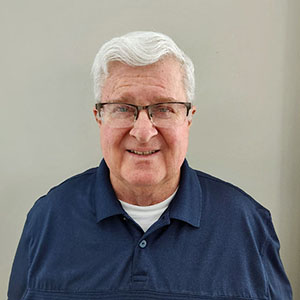
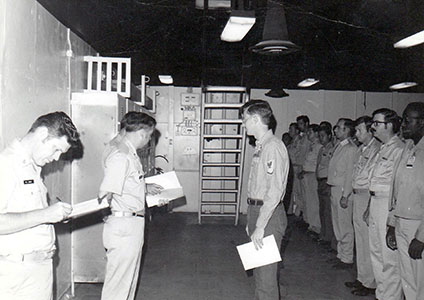
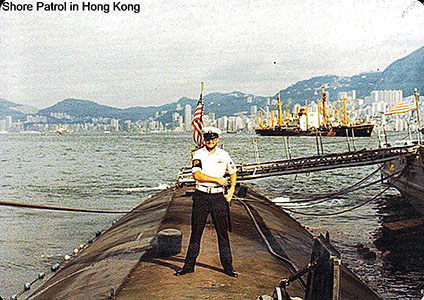
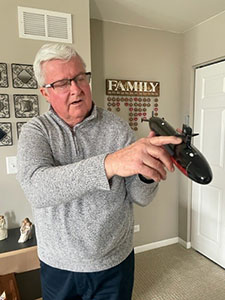
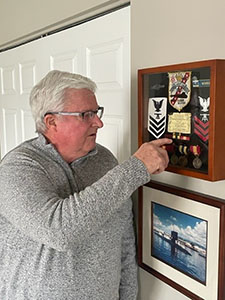
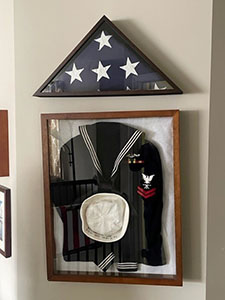
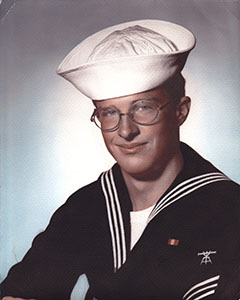
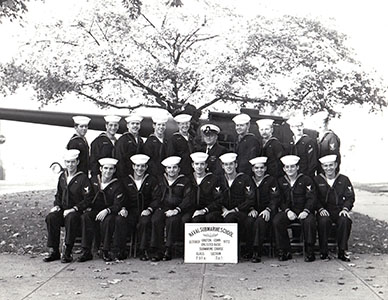
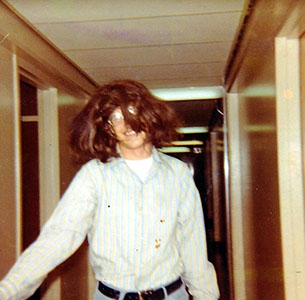
In November 1971, he began boot camp at Naval Training Center San Diego. “No boot camp is easy; their task is to break you of your civilian life.” He recalls that Army and Marine training were focused on physical development while Naval training focused on mental development. “It was stressful, but I got through it.”
During boot camp, he volunteered for submarine training. “I always wanted something special. When I learned about submarines, I said, ‘that’s an elite force,’ and volunteered.” In return, Jeff found a close-knit brotherhood. “Submariners are unique,” he explains. “It takes a special breed of people to sit underwater for 90 days at a time.”
After boot camp, he began specialized training in the Navy’s Basic Electricity and Electronics Program (BEEP) school, then went to Mare Island Naval Shipyard, near Vallejo, California, for Fire Control Phase I A School for specialized weapons systems training. There, he joined the precision drill team. “That was fun, and it got me out of some duties, but it was also hard because you had to practice, practice, practice.”
After 14 weeks, Jeff was sent to Naval Station Great Lakes, for Fire Control Phase II, where training became more in-depth. Finally, he was sent to Naval Submarine Base New London, Connecticut, for specialized submarine training and instruction on the MK 113/6 fire control system which was used on submarines at the time.
Eventually, after nearly two years of comprehensive training, Jeff made his way to Puget Sound Naval Shipyard and Intermediate Maintenance Facility, near Bremerton, Washington, where he was assigned to serve as a fire control technician on the USS Queenfish (SSN-651), which was designed to hunt and attack enemy submarines.
“At that time, the Queenfish was in drydock, which was difficult because when you get on a submarine you have to be qualified on every system on the boat,” he says. “But in drydock, most of those systems are being refurbished and they’re not on the boat. That means you’re walking around imagining where something would be!” In May 1975, after conducting sea trials to test systems and the boat’s ability to submerge and rise, the Queenfish traveled from Bremerton to San Diego to Pearl Harbor, the boat’s home port.
According to Jeff, the Vietnam War ended during his training, but the Cold War was raging. “Our job was reconnaissance and if we were ever caught, our cover story was ‘we were in international waters for the peaceful collection of intelligence,’ which was basically true. The other side was doing the same thing.”
On missions, the Queenfish often shipped from Naval Base Subic Bay, Philippines, and traveled west for underwater patrols that would last 90 days or more. “When we loaded out, there were boxes of supplies sitting on the floor of the berthing compartment, and we would walk on the boxes,” he remembers. “Supplies went everywhere – bathroom, shower room stalls, you name it. Storage is limited on a boat, especially when you’re loaded for 90 days.”
In November 1977, Jeff’s time on the Queenfish and his initial enlistment ended. He reenlisted and went back to New London where he became an attack training instructor for the MK 113/6 and eventually the MK 117 fire control systems. In September 1981, he earned his honorable discharge.
While stationed at Great Lakes in 1973, Jeff met his future wife, Mary, and they married in 1975. After completing his military service in 1981, the couple, and their growing family, moved in with Mary’s mother and father, and eventually settled in Wheaton where they raised three daughters: Lisa, Malia, and Michelle.
By combining his military service and college courses taken later during his time in the Navy, Jeff built a career in information technology. Jeff and Mary are now retired and live in North Aurora where he does “anything he wants,” including working on computers, serving on the local emergency management team, singing with the church choir, holding membership in the Knights of Columbus, and enjoying his six grandchildren, all of whom live in the area.
Thank you for your service, Jeff, we hope you enjoy your well-earned, much-deserved Honor Flight experience!


